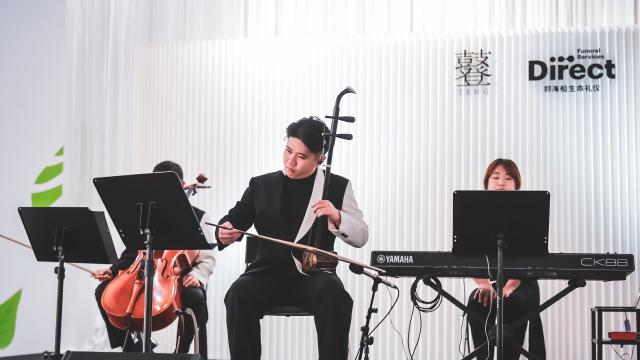A deck of cards is part of a toolkit co-developed by SIT Associate Professor Ingrid Wilson and Care Corner Singapore social workers Ms Valencia Ng and Ms Charissa Quek to better help women navigate the complex journey after leaving an abusive partner.
A deck of cards is laid out on the table. Instead of numbers or shapes, they are divided into two themes: key decisions for women who have just left an abusive marriage and challenges and factors influencing these decisions.
The former covers personal protection order, divorce, custody and parenting, finances, employment, and housing. The latter addresses emotional needs: feeling safe, mothering, rethinking relationships, finding closure, becoming themselves again, and seeing a future.
These cards are meant to help victims of abuse gain clarity on their next steps, enabling them to make informed decisions as they navigate a difficult season in their lives. They are part of a toolkit that Singapore Institute of Technology (SIT) Associate Professor Ingrid Wilson worked on, with Care Corner Singapore’s Project StART. The latter is one of two Protection Specialist Centres in Singapore that provide integrated care for victims of family violence and sexual assault.
The toolkit is the result of a research project led by A/Prof Wilson, which focused on the decisions women have to make post-separation.
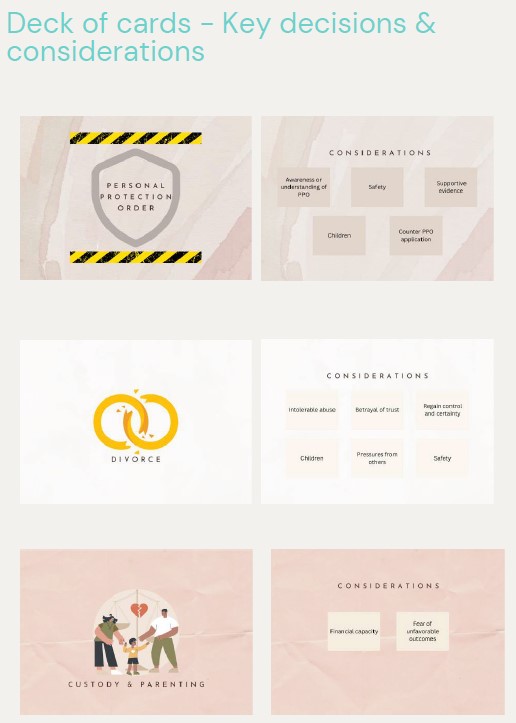
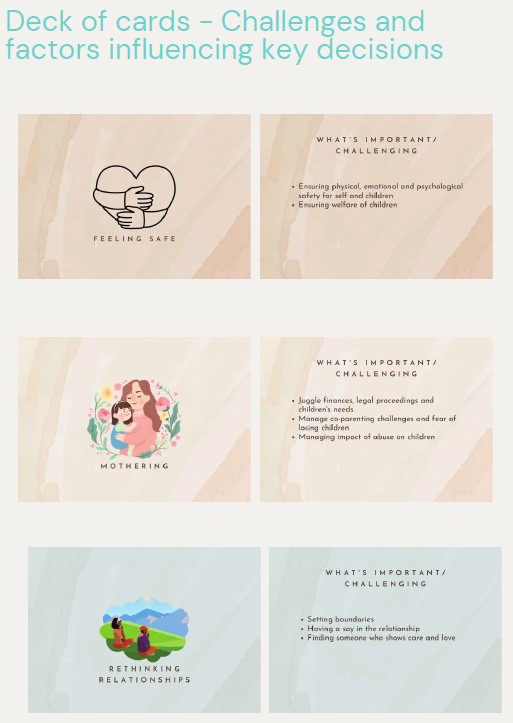
A deck of decision-making cards co-developed by SIT and Care Corner Singapore guides women who have left abusive relationships through key practical and emotional considerations. (SIT Photo: Ingrid Wilson)
Finding Clarity in Complexity
To A/Prof Wilson, research should inform on-the-ground efforts. “One of the things that is really important about research at SIT is that it is grounded in community,” she said.
Her project, titled “Understanding women's decision-making post-separation from an abusive spouse”, is one way SIT uses research to tackle real-world challenges together with industry partners.
The research topic emerged when A/Prof Wilson connected with Care Corner in 2021, to strengthen the collaboration between academia and industry. There, she met Ms Valencia Ng and Ms Charissa Quek, social workers from the Care Corner’s Project StART team. The duo expressed interest in understanding the considerations women often have to confront after leaving an abusive relationship.
These women often find themselves in a complex web – financially disadvantaged and navigating issues of housing and employment, while still coming to terms with the emotional impact of their marriage breakdown. At times, their decisions may seem at odds with their interests. For example, some of these women might give up pursuing alimony to extract themselves from the situation, shared A/Prof Wilson.
A/Prof Wilson saw the value of plugging this gap. Most existing literature looks at how and why women decide to leave or stay in an abusive relationship, but not much has been done to study what they have to navigate through after leaving. “I wanted to work through the ambivalence that women face when ending a relationship after experiencing abuse,” said the professor who joined SIT in 2018 and teaches Sociology to Nursing and Allied Health students across the Health and Social Sciences Cluster.
As the lead researcher, she developed a problem statement and methodology to tackle the issue. Care Corner recruited 11 willing participants of different races, marital and employment statuses from their client base for the project, which involved in-depth interviews and focus group sessions.
Aware that these participants were victims of family violence and abuse, the team was careful to ensure they felt safe – physically and emotionally during interviews. “They were coming into a safe space, and as an experienced family violence researcher, I had a good grounding regarding safety protocols and empathetic ways of asking about sensitive topics,” A/Prof Wilson added.
During these sessions with participants, the team realised that the women shared common thought processes despite their differing life circumstances. For example, getting custody of their children is often a top priority for mothers.
“For them, their role as a mother is central to their identity,” A/Prof Wilson said. For service providers, understanding the decision-making process of these women is crucial, as it enables them to follow up with the appropriate support, she added.
That led the team to visualise the post-separation stage as an iceberg, with visible decision points such as employment and finances above the surface, and less obvious goals such as finding closure and feeling safe, below the surface. This approach helps social workers identify and address underlying issues that women face post-separation, not just practical ones.
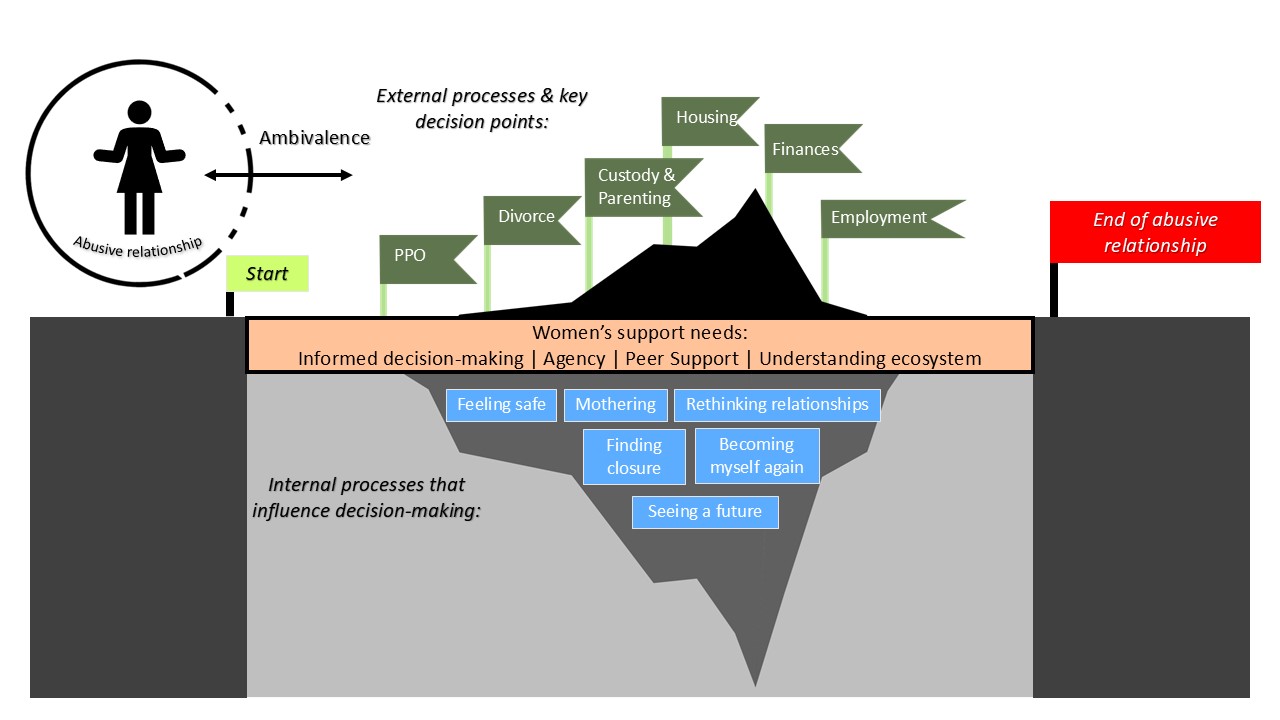
The iceberg model is part of the toolkit designed to help social workers initiate conversations about visible challenges and hidden emotional struggles clients face after separation. (SIT Photo: Ingrid Wilson)
The findings informed the development of the toolkit, which comprises the iceberg diagram and a deck of cards. This toolkit which is in use today aims to help social workers kickstart conversations with their clients about the tangible challenges they will face post-separation, as well as the unseen emotional processes they may be grappling with.
“The Practice Toolkit has greatly enhanced our domestic violence work at Care Corner. Practitioners trained to use it find it especially valuable when supporting victims who are ambivalent about leaving abusive relationships—one of the most common and challenging situations we encounter. We take pride in telling clients that the toolkit is based on real experiences of others, helping them feel understood and less alone,” said Martin Chok, Deputy Director, Family and Community Services, Care Corner Singapore.
International Recognition
A/Prof Wilson and Ms Ng were invited to present their findings to about 850 academics at the 2023 European Conference on Domestic Violence in Reykjavík, Iceland.
“Presenting alongside the service provider added weight to the discussion by grounding it in valuable real-world context,” said A/Prof Wilson, noting that the iceberg model received strong interest from academics.
“Co-presenting was also a great example of how applied research at SIT brings together industry and academia to create practical solutions,” she added.
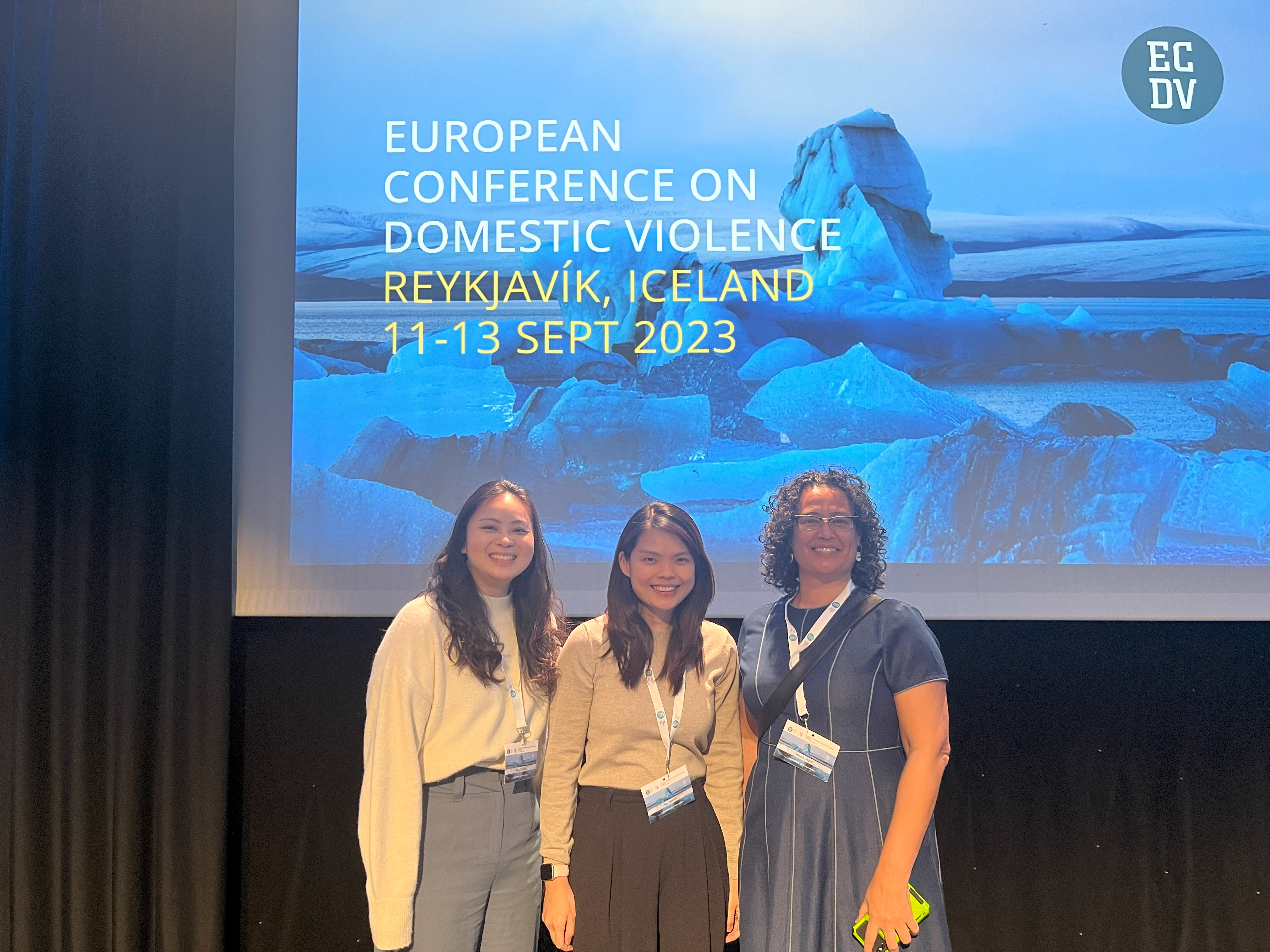
Ms Charissa Quek (L), Ms Valencia Ng (M) and A/Prof Ingrid Wilson (R) presenting their joint research at the 2023 European Conference on Domestic Violence in Reykjavik, Iceland. (SIT Photo: Ingrid Wilson)
Going forward, A/Prof Wilson aims to publish these findings and continue to use her research to empower women. “I want to use research to ensure there’s more understanding on how the quality of women’s intimate relationships has a significant impact on their health and well-being,” she said.















![[FA] SIT One SITizen Alumni Initiative_Web banner_1244px x 688px.jpg](/openhouse2025/directory/sit-teaching-and-learning-academy/sit-teaching-and-learning-academy/centre-professional-communication/sit-teaching-and-learning-academy/sit-teaching-and-learning-academy/sites/default/files/2024-12/%5BFA%5D%20%20SIT%20One%20SITizen%20Alumni%20Initiative_Web%20banner_1244px%20x%20688px.jpg)

